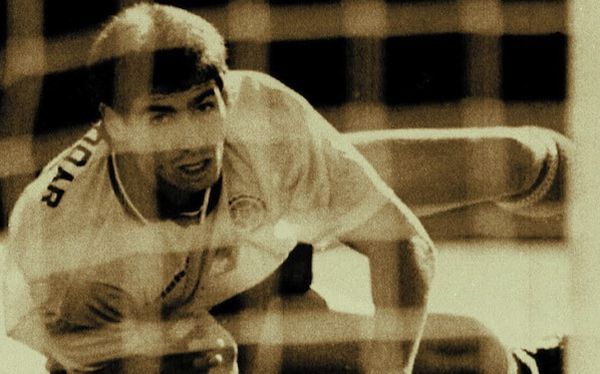Eye For Film >> Movies >> The Two Escobars (2010) Film Review
The Two Escobars
Reviewed by: Amber Wilkinson

Jeff and Michael Zimbalist's documentary may initially appear to be a snapshot of two of Colombia's famous Escobars - unrelated men, Pablo and Andrés, who share a surname, a birthplace, untimely deaths and a passion for football - but what emerges as the film progresses is a much more complex profile that shows the rise of 'narco-soccer' in mid-Nineties Colombia and the way it put the whole nation in crisis.
Pablo Escobar is probably the most widely known of the central protagonists. Arguably the most infamous drug lord in the world, he rose to the top of the underworld, to become "king of kings". His reliance on violence to solve disputes makes it seem unlikely that his path would ever cross that of Andrés, a young striker, who had no interest in illegal goings on and who was intent on only one thing - lifting the World Cup for his country.

But football was not only a sport that Pablo was fanatical about - it was also the perfect means by which to launder vast sums of drug-sullied cash. So, as the various kingpins of the Colombian drugs world bought into the country's top teams and used the sides as a cash laundedrette, they also found joy in these new playthings on which they could wager side bets with one another. Consequently, money poured into the game, helping the country retain its best players and ensuring a sudden rise in their footballing fortunes on the world stage. Andrés, who played for one of Pablo's teams was just another pawn in a game that would, through an infamous own-goal at the 1994 World Cup, lead unwittingly to his own death.
The Zimbalists have done their research and assembled an almost scarily wide-ranging set of archive footage. By editing much of this so that newsreel stories overlap, they are able to convey huge amounts of information in small chunks of screentime, all given a driving momentum by a throbbing and ecletic score. They have also gained access to an impressive array of interviewees. Several members of Pablo's Medellin cartel - including his former right-hand man - talk openly about the drugs scene of the time period, while members of Andrés' family talk about his firm belief in ending violence in Colombia, only to become a victim of what, in many ways, was a completely random act, himself.
Despite the fact that there is easily enough material here to have made individual documentaries on both men, a virtue is made of marrying them together, so that it is easy to see how Colombia became a country of dislocation, a place that - despite Reagan-era drug war intentions - needed little external influence to tear itself apart from within.
The Zimbalists' clear-sighted approach to this very complex story is what raises this film to another level. Although they document the affect of drugs and violence on the local populace, they also take time to show that Pablo, although in one sense ruling by fear, was also winning 'hearts and minds' by pouring money into slums, building local football pitches and, on one occasion, creating housing for 700 people who were living in a dump.
By showing that things are rarely as black-and-white as 'evil' or 'saintly', the directors help us to see how Pablo was able to run for public office to avoid extradition to the US. They also take time to show how the eventual crackdown on drugs and the death of both men had a devastating affect not only on the nation but on its footballing status. “We exchanged winning for our safety," says the 1994 squad's perceptive coach.
Just like the silky attacking moves of the 1994 Colombian team, many of which are cleverly woven into the film, the narrative passes smoothly between these two Escobars, sport and drugs, so that a gripping picture emerges - one in which penalty shoot-outs, sadly, come with a bullet.
Reviewed on: 03 May 2010















